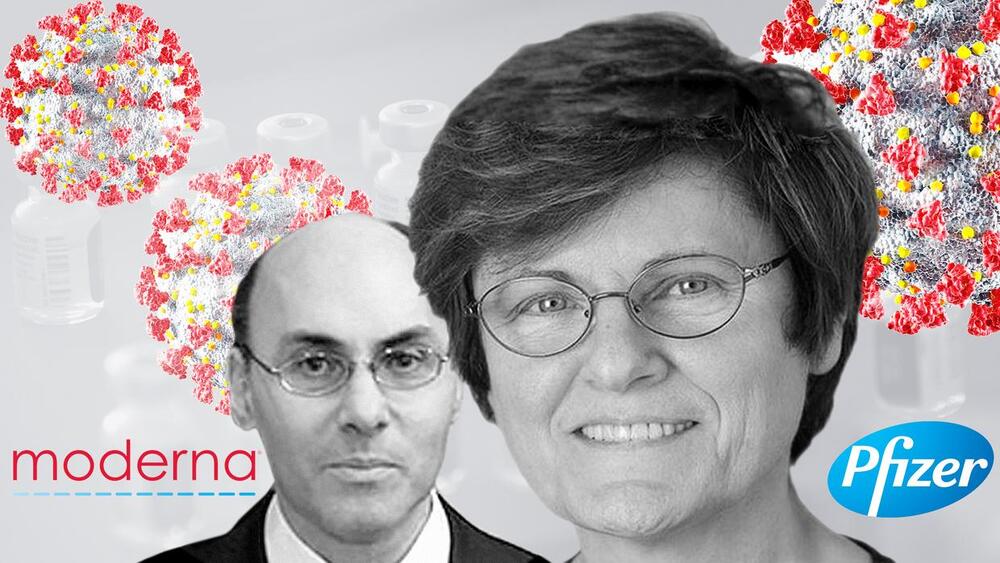The expert whose company uncovered the hack also backs US officials’ view that Russia was behind it.



Circa 2014
US space agency commissions design for its first warp speed spaceship.

Katalin Karikó saw her early research rejected but she persisted and is now tipped for a Nobel Prize together with her colleague Dr Drew Weissman. Their breakthrough invention is now the key to the Moderna and Pfizer vaccines, and could open the door to new medical cures. (Leer en español)
Dr. Steve Horvath, a professor of genetics and biostatistics at UCLA, has found a way to measure biological aging – a type of “clock” – based on the methylation pattern of an organism’s genome. Methylations are biochemical processes that modify the activity of a DNA segment without changing its sequence – a type of epigenetic change. This video primer explains the basics of epigenetic clocks, the topic of our interview with Dr. Steve Horvath, coming soon!
Get the show notes here:
https://www.foundmyfitness.com/episodes/epigenetic-clock/
Episode highlights:
• 00:00:09 — A person’s risk of disease is more dependent on their biological age than their chronological age.
• 00:00:09 — Epigenetics refers to processes that can affect gene expression without changing the DNA sequence. Methylation is a type of epigenetic change that occurs over a lifetime in a predictable way and can be used to measure biological age.
• 00:01:17 — The Horvath clock can accurately predict a person’s chronological age based on only the epigenetic information in their blood.
• 00:01:54 — The GrimAge clock can predict the risk and time of onset of cancer, heart disease, and death.
• 00:02:19 — Certain drugs can reverse a person’s epigenetic age, but the effects on biological age are unknown.
• 00:03:09 — The discovery of an anti-aging drug is on the horizon.

Researchers give 10 bold predictions about human genomics by the year 2030.
Hey it’s Han from WrySci HX and we’ll try to figure out what the world will be like in 2030 in terms of human genomics. An article in Nature has listed its top 10 predictions in this field for the next decade. Let’s find out! More below ↓↓↓
Subscribe! =]
Please consider supporting 🙏
Patreon: https://www.patreon.com/wrysci_hx.
No matter who you are or where you are, YOU can participate in the science done at NASA and make new discoveries alongside NASA scientists. Watch #NASAScience Live on Wednesday, Dec. 16 at 3:00 p.m. EST to hear from people around the globe about how they’re doing NASA science and learn how you too can get involved with NASA’s citizen science projects.
https://music.youtube.com/watch?v=bAdqazixuRY&list=RDAMVMbAdqazixuRY
► Album & 4k Video: http://NigelStanford.com/y/a-/Automatica.
► Spotify: http://NigelStanford.com/y/Spotify.
Subscribe and like to see more Robot videos, as I release them for my album Automatica.
Robots rock, they were fun to work with. My favorite is the robotic drummer. More work to be done, and maybe I could play with them live. Stay tuned smile Thank you to Kuka, Sennheiser and Roland.
(766) — YouTube
Follow A Glitch in the Matrix.
https://instagram.com/glitchmatrixdoc.
https://www.facebook.com/glitchmatrixdoc.
https://twitter.com/glitchmatrixdoc.
What if we are living in a simulation, and the world as we know it is not real? To tackle this mind-bending idea, acclaimed filmmaker Rodney Asher (ROOM 237, THE NIGHTMARE) uses a noted speech from Philip K. Dick to dive down the rabbit hole of science, philosophy, and conspiracy theory. Leaving no stone unturned in exploring the unprovable, the film uses contemporary cultural touchstones like THE MATRIX, interviews with real people shrouded in digital avatars, and a wide array of voices, expert and amateur alike. If simulation theory is not science fiction but fact, and life is a video game being played by some unknowable entity, then who are we, really? A GLITCH IN THE MATRIX attempts to find out.
Available everywhere February 5, 2021
Directed by Rodney Ascher.
http://aglitchinthematrixfilm.com/
For more great titles, visit Magnolia Selects: https://www.magnoliaselects.com/